By Didier Bikorimana, BBC Great Lakes service
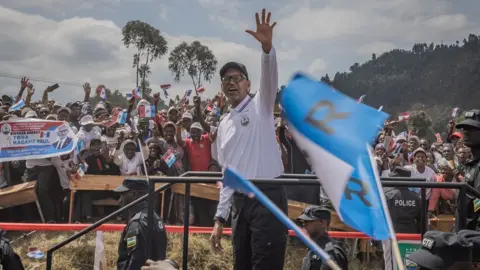 AFP
AFPThere is very little room for improvement for Rwanda’s President Paul Kagame in Monday’s election after getting almost 99% of the vote last time round.
The scale of his victory in 2017, along with his 95% in 2003, 93% in 2010 and 97% in 2003, raised some questions about how truly democratic the elections were.
Criticism that the former refugee and rebel leader confidently bats away.
“There are those who think 100% is not democracy,” Mr Kagame told thousands of cheering supporters at a campaign rally in western Rwanda last month.
Referring to elections elsewhere, without naming a specific country, he added: “There are many who are voted in office with 15%… Is that democracy? How?”
What happens in Rwanda is Rwanda’s business, the president insisted.
His backers agreed, chanting “they should come and learn” as they waved the red, white and sky blue flags of the governing Rwandan Patriotic Front (RPF) party.
At over 6ft (1.83m), the wiry 66-year-old father of four cuts a stern and imposing figure amid the crowds. He can crack a smile and a joke or two, but the bespectacled leader can often take on the grimace of a disappointed elder.
His soft, thoughtful delivery forces the listener to take note and when he speaks he is usually very direct, rarely mincing his words.
Even on the occasions when he deploys more cryptic or diplomatic language, he will use insinuation to let people know what he is talking about.
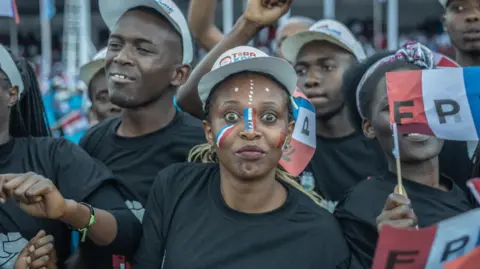 AFP
AFPMr Kagame’s life has been shaped by the conflict between Rwanda’s Tutsi and Hutu ethnic groups.
In order to overcome this, his government now insists that people identify as Rwandans rather than with a specific ethnic group.
President since 2000, he is running for a fourth term, but Mr Kagame has been the real leader of the East African country ever since July 1994. This is when his rebel army ousted the Hutu extremist government which had orchestrated the genocide of that year.
He initially served as vice-president and defence minister.
Many of his supporters, among them some leading Western politicians, praise him for bringing stability and rebuilding Rwanda after the mass slaughter in which 800,000 ethnic Tutsis and moderate Hutus were killed.
Some accuse his then rebel army of revenge killings at the time, but his government has consistently said they were isolated instances and that those responsible were punished.
The president is not backward when it comes to criticising the West, but he also tries to secure its backing by sometimes playing on the guilt over the failure to prevent the genocide.
Rwanda was also a partner and a financial beneficiary in a now-junked UK scheme to send asylum seekers to the country.
“I will vote for PK, of course,” says university student Marie Jeanne, referring to Mr Kagame by his initials.
“Look at how I am studying well. If he was not president, I might not study well maybe due to lack of security,” she tells the BBC.
For her, the answer to who she would vote for was obvious, but there are two other names on the ballot paper for the nine million registered voters to consider.
The Democratic Green Party’s Frank Habineza and independent Philippe Mpayimana are both running again, in a repeat of the presidential election seven years ago.
However, last time round they got just over 1% of votes between them.
Other political parties have backed Mr Kagame for president.
Opposition politician Diane Rwigara, an outspoken critic of Mr Kagame, was barred from taking part on the grounds that she did not present the correct paperwork, which she dismissed as an excuse to stop her running.
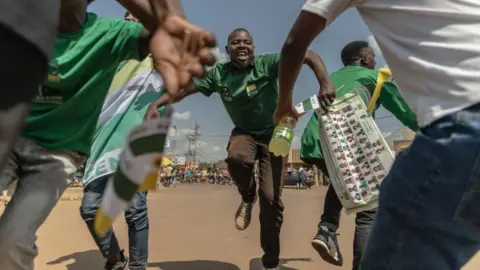 AFP
AFPMr Kagame has also been accused of silencing, through imprisonment and intimidation, other potential opponents. He once told the Al Jazeera news channel he should not be held responsible for a weak opposition.
His powerful network of spies has allegedly carried out a spate of cross-border assassinations and abductions.
They are alleged to have even targeted their own former boss, ex-intelligence chief Col Patrick Karegeya, who fled Rwanda after falling out with Mr Kagame.
He was murdered in 2014 in his suite at an upmarket hotel in South Africa’s main city, Johannesburg.
“They literally used a rope to hang him tight,” said David Batenga, Col Karegeya’s nephew.
Mr Kagame did little to distance himself from the killing, while officially denying any involvement.
“You can’t betray Rwanda and not get punished for it,” he told a prayer meeting shortly afterwards. “Anyone, even those still alive, will reap the consequences. Anyone. It is a matter of time.”
The president’s pursuit of security at home has led him to send troops into neighbouring Democratic Republic of Congo, saying they are pursuing a Hutu rebel group. Rwanda is also accused of backing the M23 rebel group there – something which it denies, despite a wealth of evidence, including in a recent UN report.
“Really to be honest, [the election] is a farce,” says Filip Reyntjens reflecting on the poll. The Belgian political scientist is an expert on the Great Lakes region.
“Of course I don’t know what will happen this time, but previous elections have been… a circus.
“I mean the national electoral commission attributes votes rather than counting votes,” he alleges, citing the last European Union (EU) observer mission report of 2003 and the Commonwealth observer mission report of 2010.
Rwanda’s electoral commission says on its website that it conducts “free, fair and transparent elections to promote democracy and good governance in Rwanda”.
“To me, the upcoming presidential election in Rwanda is a non-event,” says Dr Joseph Sebarenzi, a former speaker of the Rwandan parliament, who lost parents and many family members during the genocide, and now lives in exile in the US.
“The election is like a football game where the organiser is also a competitor, selects other competitors, orders people to attend the game, and where everyone knows the pre-determined winner but must behave as if the game is real.”
Mr Kagame, a keen football fan who closely follows English Premier League club Arsenal, would reject this description.
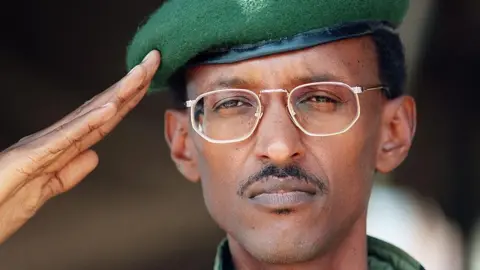 AFP
AFPBorn in 1957 into a well-to-do household in central Rwanda, he was the youngest of five children.
But, barely two years old, he became a refugee in neighbouring Uganda, fleeing the persecution and pogroms of the late 1950s with his family and thousands of others from the minority Tutsi population.
Despite being just an infant at the time, Mr Kagame has said he can still “remember looking out onto the next hill. We could see people burning the houses there.
“They were killing people. My mother was so desperate. She didn’t want to leave this place,” the president told American journalist and unofficial biographer Stephen Kinzer.
These killings came after Belgian colonisers switched which ethnic group they backed, to favour an emerging ruling elite from the majority Hutu ethnic group, some of whom had suffered ill-treatment under the Tutsi monarchy.
Rwanda gained independence in 1962.
In the late 1970s, Mr Kagame made a series of clandestine visits back home.
While in the capital, Kigali, he frequented a particular hotel in Kiyovu, one of the city’s wealthiest neighbourhoods. Its bar was popular with politicians, security officers and civil servants who gossiped as they sipped their beer after work.
Mr Kinzer wrote that the future leader would listen in to their conversations as he drank an orange soda sitting alone at a table and avoiding attention.
These visits to his homeland sharpened his interest in the art of espionage.
He trained in military intelligence in Uganda and joined the successful rebellion in that country led by Yoweri Museveni that saw him take power in 1986. Mr Kagame further trained in Tanzania, Cuba and the US.
He then led his mainly Tutsi rebel army which marched into Rwanda in 1990.
“[The training] was useful. Cuba, in its wars with the US and connection to Russia, was quite advanced in matters of intelligence. There was also political education: The struggle is about what? How do you sustain it?” he told Mr Kinzer.
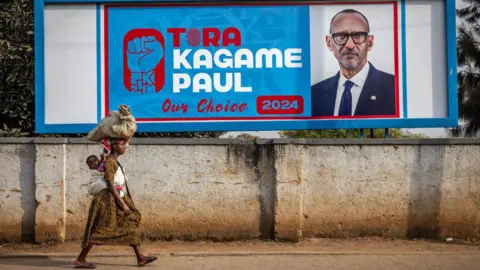 AFP
AFPHe has sought to sustain the struggle by targeting economic development – Mr Kagame suggested Rwanda would emulate Singapore or South Korea and achieve development in a generation.
Although Rwanda fell short of its middle-income country target by 2020, Prof Reyntjens says “this is a well-run country”.
“The problem in Rwanda is with political governance, there is no level playing-field, there is no space for opposition, there is no freedom of speech, [which] risks undoing the achievements of good technocratic governance.”
But Mr Kagame maintains the huge crowds of supporters at his rallies are just one example of the trust and love Rwandans have for him and their wish that he continue as their leader, although he once said he would have groomed a successor by 2017.
Because of constitutional changes, he could, in theory, remain in power in 2034.
“The context of every country” matters, Mr Kagame said in a live interview on the state broadcaster last month, addressing the issue of his time in power.
“[The West says]: ‘Oh you have been there too long’. But that’s none of your business. It’s the business of these people here.”
Thousands of miles away in the US, Dr Sebarenzi says he does not know what the future holds for his home country, affectionately known as the land of a thousand hills, but adds: “History shows that in countries where the head of state is stronger than state institutions, change of power can turn violent, leading to chaotic post-regime periods.”
More BBC stories about Rwanda:
 Getty Images/BBC
Getty Images/BBC


































